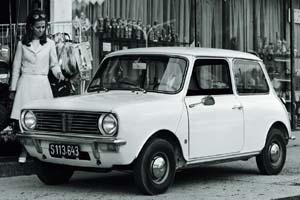|
|
| Line 1: |
Line 1: |
| | [[Image:Mini_Clubman.jpg]] | | [[Image:Mini_Clubman.jpg]] |
| | | | |
| − | '''Mini Clubman (ADO26). 1969–82 (prod. 275,583 saloon approx., 197,606 estate). 2-door saloon, 2-door estate (plus two rear doors). F/F, 998, 1098, 1275 cm³ (4 cyl. OHV).''' Mini with ADO16 engine and bluff front end from the man who designed the [[Ford Cortina Mk II|Mk II Cortina]]. Marketed as a new, modern shape for the 1970s, but cheekiness and balance of original lost. Numerous improvements on old Mk II Minis, including wind-up windows, new dashboard and face-level ventilation, and ''two'' door mirrors (at least initially). Dry rubber suspension for saloon and estate in 1971, abandoning Hydrolastic. Automatic with 998 cm³ only. Australia and South Africa had distinctive Clubmans. Australian 1275 GT was officially a Clubman; not so with British model. Began to date rapidly in the 1970s as [[Renault 5]], [[Fiat 127]] and other rivals came on stream. Minor facelift in 1976 with cross-pattern grille. Saloon deleted 1980; estate continued to 1982. | + | '''Mini Clubman (ADO26). 1969–82 (prod. 275,583 saloon approx., 197,606 estate). 2-door saloon, 2-door estate (plus two rear doors). F/F, 998, 1098, 1275 cm³ (4 cyl. OHV).''' Mini with ADO16 engine and bluff front end from the man who designed the [[Ford Cortina Mk II|Mk II Cortina]]. Marketed as a new, modern shape for the 1970s, but cheekiness and balance of original lost. Numerous improvements on old Mk II Minis, including wind-up windows, new dashboard and face-level ventilation, and ''two'' door mirrors (at least initially). Dry rubber suspension for saloon and estate in 1971, abandoning Hydrolastic. Automatic with 998 cm³ only. Australia (listed separately) and South Africa had distinctive Clubmans. Australian Morris Mini Clubman 1275 GT was officially a Clubman; not so with British model. Began to date rapidly in the 1970s as [[Renault 5]], [[Fiat 127]] and other rivals came on stream. Minor facelift in 1976 with cross-pattern grille. Saloon deleted 1980; estate continued to 1982. |
| | | | |
| | | | |
| − | ''Manufacturing locations:'' Longbridge, England; Cape Town, South Africa; Enfield, New South Wales, Australia | + | ''Manufacturing locations:'' Longbridge, England; Cape Town, South Africa |
| | | | |
| | ''Marque:'' [[Mini]] | ''Predecessor:'' [[Austin Mini Mk II]], [[Morris Mini Mk II]] | | ''Marque:'' [[Mini]] | ''Predecessor:'' [[Austin Mini Mk II]], [[Morris Mini Mk II]] |
Revision as of 05:27, 16 March 2008

Mini Clubman (ADO26). 1969–82 (prod. 275,583 saloon approx., 197,606 estate). 2-door saloon, 2-door estate (plus two rear doors). F/F, 998, 1098, 1275 cm³ (4 cyl. OHV). Mini with ADO16 engine and bluff front end from the man who designed the Mk II Cortina. Marketed as a new, modern shape for the 1970s, but cheekiness and balance of original lost. Numerous improvements on old Mk II Minis, including wind-up windows, new dashboard and face-level ventilation, and two door mirrors (at least initially). Dry rubber suspension for saloon and estate in 1971, abandoning Hydrolastic. Automatic with 998 cm³ only. Australia (listed separately) and South Africa had distinctive Clubmans. Australian Morris Mini Clubman 1275 GT was officially a Clubman; not so with British model. Began to date rapidly in the 1970s as Renault 5, Fiat 127 and other rivals came on stream. Minor facelift in 1976 with cross-pattern grille. Saloon deleted 1980; estate continued to 1982.
Manufacturing locations: Longbridge, England; Cape Town, South Africa
Marque: Mini | Predecessor: Austin Mini Mk II, Morris Mini Mk II
Off-site links



